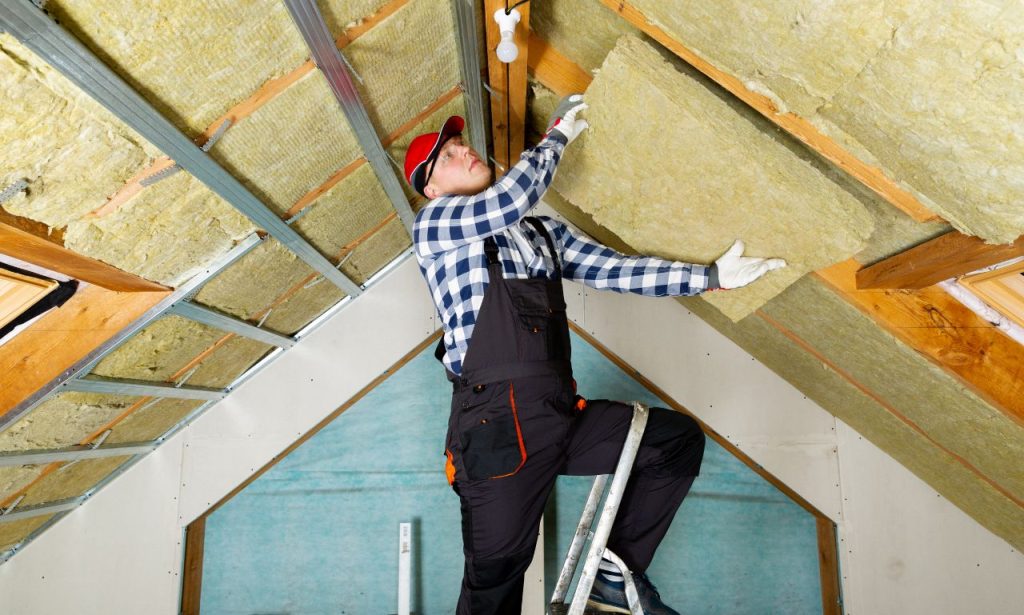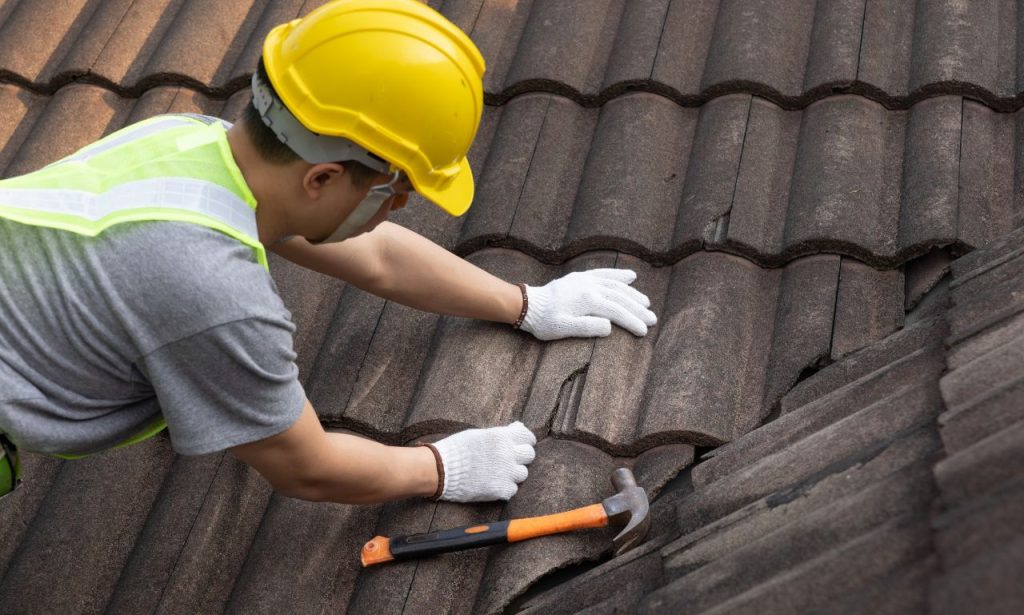Your home deserves the best from the ground up, especially when it comes to insulation and roofing. With the right insulation from local roofers, you can transform your house into a haven of comfort and efficiency.
The Importance of Proper Roof Installation
A roof is more than just a cover over your head—it’s your home’s shield against the unpredictable whims of nature. Think of it as the guardian keeping the rain, snow, wind, and harsh sun at bay. But not all roofs are created equal, and the way your roof is installed can make all the difference between a cozy home and a leaky nightmare.
When you entrust your roof to skilled insulation local roofers, you’re not just getting a roof; you’re investing in peace of mind. These professionals bring invaluable knowledge about the best materials and techniques suited to your specific region. They understand the local climate nuances that can impact your roof’s longevity and performance.
Proper roof installation ensures every shingle, tile, or panel is securely placed, the underlayment is correctly applied, and all flashing and seals are meticulously handled. This attention to detail prevents common issues like leaks, drafts, and energy loss. And let’s not forget the aesthetic appeal—a well-installed roof enhances your home’s curb appeal, potentially increasing its market value.
Moreover, when insulation and local roofers work in tandem, they create a synergistic effect. A properly insulated attic beneath a professionally installed roof keeps your indoor environment stable, reducing strain on your heating and cooling systems. It’s all about creating a harmonious top-to-bottom solution that benefits you in multiple ways.
Different Types of Roofing Materials
Selecting the perfect roofing material is like choosing the right outfit for a big event—it needs to look good, perform well, and suit the occasion. Your roof’s material affects not just the appearance of your home but also its durability, maintenance needs, and energy efficiency. Let’s delve into some of the most popular roofing materials.
Benefits and Drawbacks of Asphalt Shingles

Asphalt shingles are the tried-and-true veterans of the roofing world. They’ve been the go-to choice for homeowners for decades, and it’s not hard to see why. Affordable, versatile, and relatively easy to install, asphalt shingles offer a balance of cost and performance that’s hard to beat.
One major advantage is variety. They come in an array of colors and styles, allowing you to customize your roof’s look. They perform well in a range of climates, providing decent protection against wind, rain, and moderate hail.
However, asphalt shingles have limitations. Their lifespan is typically shorter than some alternatives, averaging around 20 to 30 years. They can be susceptible to damage from extreme temperature fluctuations and aren’t the most environmentally friendly due to their petroleum-based composition.
When installed by experienced insulation local roofers, asphalt shingles can offer reliable protection. These professionals ensure shingles are properly aligned and secured, crucial for preventing leaks and wind damage. Paired with quality insulation, they help maximize your home’s energy efficiency.
Advantages of Metal Roofing
If asphalt shingles are the reliable sedans of roofing, metal roofs are the sleek sports cars. They bring a modern aesthetic and a host of benefits that make them an attractive option.
Metal roofs are champions of durability. They can last 50 years or more with minimal maintenance. They’re incredibly resistant to the elements—standing strong against heavy snowfall, high winds, and even wildfires. In fact, they often come with the highest fire ratings, giving you added peace of mind.
Energy efficiency is another area where metal roofs shine. They reflect solar radiant heat, reducing cooling costs by up to 25% in hot climates. This reflective property keeps your home cooler in the summer, easing the load on your air conditioning system.
On the downside, metal roofs have a higher upfront cost than asphalt shingles. They can also be noisier during heavy rain or hail unless additional insulation is installed—a factor your local roofing contractors can help mitigate.
Working with roofers skilled in metal installations is crucial. Installation requires precision to ensure panels are securely fastened and properly sealed. These roofers understand how to incorporate insulation solutions that address potential noise issues, giving you the best of both worlds.
Exploring Tile Roofing Options
For those seeking timeless beauty and long-lasting performance, tile roofing is worth considering. Whether crafted from clay or concrete, tile roofs offer a distinctive appearance that can elevate your home’s style.
Tile roofs are built to last—often exceeding 50 years with proper care. They’re resistant to rot, insects, and fire, providing robust protection. Their heavyweight contributes to excellent thermal mass, helping regulate indoor temperatures by absorbing heat during the day and releasing it at night.
However, installation isn’t without challenges. The weight requires a strong underlying structure, and the process is more complex and time-consuming than other roofing types. Tiles can be brittle and may crack if walked on, making maintenance delicate.
This is where the expertise of insulation local roofers becomes invaluable. They assess whether your home’s structure can support a tile roof and execute the installation with precision. They recommend insulation strategies that complement the thermal properties of tile roofing, enhancing energy efficiency.
Understanding Attic Insulation

While your roof stands guard against the elements, insulation is the silent hero within your home’s structure. It plays a crucial role in maintaining indoor temperatures, reducing energy consumption, and enhancing comfort. Let’s explore how insulation works and why it matters.
The Impact of Insulation on Energy Efficiency
Insulation resists heat transfer. In summer, it keeps outside heat from infiltrating your home. In winter, it prevents indoor warmth from escaping. Without adequate insulation, your home succumbs to temperature fluctuations, leading to overworked heating and cooling systems. This not only spikes energy bills but also strains HVAC equipment.
Proper insulation creates a thermal envelope—a barrier optimizing your home’s energy performance. By investing in quality insulation, you can see a substantial reduction in energy consumption, translating to lower utility costs and a smaller environmental footprint.
Cost Savings through Proper Insulation
Let’s talk numbers. Heating and cooling account for nearly half of the average home’s energy consumption. Any improvement in insulation can lead to significant savings. Homeowners can save up to 15% on heating and cooling costs by properly insulating attics, floors, and crawl spaces.
Over time, these savings offset the initial investment in insulation materials and installation. Adequate insulation can also increase your home’s resale value. Prospective buyers often favor energy-efficient homes, recognizing the long-term cost benefits and comfort levels.
When you collaborate with insulation local roofers, you’re taking a comprehensive approach. They identify areas where heat loss is significant and recommend targeted solutions. It’s about maximizing efficiency and ensuring your investment yields high returns.
Enhancing Home Comfort with Insulation
Beyond dollars, insulation enhances comfort. Imagine consistent temperatures from room to room, no drafts, balanced humidity levels. Insulation contributes to a healthier indoor environment by reducing mold growth, which thrives in moist, uninsulated spaces. It also acts as a barrier against external pollutants and allergens, improving air quality.
Moreover, insulation helps with soundproofing. It absorbs sound waves, reducing noise from outside and between rooms. This creates a more peaceful living environment, free from the disturbances of traffic, neighbors, or even rain on the roof.
Benefits of Hiring Local Insulation Roofing Contractors
When it comes to roofing and insulation needs, local expertise is a game-changer. Hiring local roofers offers advantages that extend beyond convenience.
Local Expertise and Knowledge of Regional Climate
Every region has its own climatic challenges. Whether it’s heavy rains, sun-soaked days, or snow-laden winters, local roofers understand the specific demands on your roofing system. They have firsthand experience with materials that perform best in your area and are up-to-date with local building codes.
Furthermore, local roofers are attuned to common issues homes in your area face. They offer proactive solutions to prevent problems before they arise, saving you time, money, and headaches.
Range of Services Offered by Local Roofers
Local roofing contractors are often a one-stop shop. Their services typically include:
- Roof Inspections: Regular assessments to identify potential issues early.
- Repairs: Fixing leaks, replacing damaged shingles, addressing structural concerns.
- Installation: Installing new roofs with precision.
- Maintenance: Routine cleaning and upkeep to extend roof lifespan.
- Emergency Services: Quick response to storm damage or unexpected problems.
Choosing local roofers means accessibility. Need an urgent repair after a storm? They’re just a call away. Building a relationship with a local company means consistent quality and personalized service.
Importance of Regular Roof Maintenance

Your roof endures a lot—exposed to harsh weather, UV radiation, environmental debris. Regular maintenance isn’t just recommended; it’s essential for longevity and performance.
Routine tasks include:
- Cleaning Gutters: Preventing water buildup and damage.
- Removing Debris: Keeping the roof clear to avoid moisture retention.
- Inspecting for Damage: Identifying and repairing issues like loose shingles.
- Checking Insulation and Ventilation: Ensuring proper attic insulation and ventilation to prevent moisture problems.
Staying on top of these tasks prevents minor issues from escalating into costly repairs or premature replacement. Insulation local roofers can set up maintenance schedules and perform tasks efficiently, giving you one less thing to worry about.
Best Practices for Selecting Insulation Materials
Choosing the right insulation material is critical in optimizing energy efficiency. With so many options, consider several factors to make an informed decision.
Understanding R-Values and Their Importance
The R-value measures insulation’s resistance to heat flow. Higher R-values mean better effectiveness. But the ideal R-value depends on:
- Climate Zone: Different regions require different insulation levels.
- Installation Area: Walls, attics, and crawl spaces may need different R-values.
- HVAC System Type: Some systems are more efficient with higher insulation levels.
Understanding R-values helps balance upfront costs with long-term savings. An insulation material with a higher R-value may cost more initially but results in greater savings over time.
Different Types of Insulation Materials
The market offers various insulation materials with unique properties:
- Fiberglass: Made from fine glass fibers, it’s affordable and widely used. Available in batts, rolls, and loose-fill.
- Cellulose: Composed of recycled paper, it’s eco-friendly. Provides excellent coverage in hard-to-reach areas when blown in.
- Spray Foam: Expands to fill gaps, providing an airtight seal. Ideal for sealing cracks and crevices.
- Rigid Foam Boards: Offer high R-values in thin layers. Suitable for limited space areas.
- Mineral Wool: Resistant to fire and moisture, made from volcanic rock or industrial waste.
Each varies in cost, installation ease, and suitability. For instance, spray foam is excellent for sealing but may be pricier. Fiberglass batts are cost-effective but may not fill irregular spaces as effectively.
Consulting with insulation professionals near you helps navigate options and select the best material for your needs.
Factors to Consider when Choosing Insulation
Beyond R-value and material type, consider:
- Installation Area Constraints: Space limitations may dictate insulation type.
- Moisture Resistance: In humid climates or leak-prone areas, moisture-resistant materials are crucial.
- Fire Resistance: Some materials provide added safety against fire hazards.
- Environmental Impact: Options like cellulose offer sustainable choices.
- Cost: Balance your budget with long-term benefits and energy savings.
An informed decision involves weighing these factors in your home’s unique context. Professional guidance ensures you make choices enhancing comfort and efficiency without unnecessary expense.
The Role of Professional Installation

While the DIY spirit is admirable, insulation and roofing are areas where professional expertise is indispensable. Installation quality directly affects performance, safety, and longevity.
Avoiding Common DIY Mistakes
Improper installation can lead to:
- Air Leaks: Gaps or compression in insulation allow air to pass through, reducing effectiveness.
- Moisture Issues: Incorrect installation can trap moisture, leading to mold and structural damage.
- Safety Hazards: Handling materials without protection can cause health issues. Roofing work involves risks of falls and injuries.
- Code Violations: Non-compliance can result in fines or required rework.
By entrusting your project to insulation local roofers, you avoid these pitfalls. Professionals have the training to carry out work safely, efficiently, and in compliance with regulations.
Importance of Qualified Installers for Roof and Insulation
Qualified installers bring:
- Experience: They’ve encountered and solved various challenges.
- Technical Knowledge: Understanding of materials, techniques, best practices.
- Access to Quality Materials: Can source better materials, often at lower costs.
- Warranties: Many offer guarantees, giving you added protection.
They stay updated on industry advancements, ensuring your home benefits from the latest innovations in roofing and insulation technology.
Long-term Benefits of Professional Work
Investing in professional installation pays dividends over time:
- Enhanced Performance: Optimal insulation and roofing function as intended, maximizing energy savings.
- Reduced Maintenance Costs: Quality work minimizes repairs and extends lifespan.
- Safety and Compliance: Professionals adhere to safety standards and codes, reducing risks.
- Increased Home Value: Professional craftsmanship adds to property appeal and market value.
Isn’t it time you gave your home the top-to-bottom care it deserves? Connect with your insulation local roofers today, and take the first step toward a more comfortable, efficient, and valuable home.
ALSO READ: How Much Does a New Roof Cost in Ohio?
FAQs
A: Look for signs like missing or damaged shingles, leaks, sagging areas, or granules in gutters. If your roof is over 20 years old, it might be time for a professional inspection to assess its condition.
A: Yes, when installed correctly by professionals, spray foam insulation is safe. It effectively seals gaps and cracks, but proper ventilation and protective equipment during installation are essential.
A: Proper ventilation prevents moisture buildup in the attic, which can lead to mold growth and roof damage. It also helps regulate temperatures, enhancing the effectiveness of your insulation.
A: While it’s possible, it’s generally not recommended. Overlaying shingles can hide underlying issues and add unnecessary weight to your roof. Removing old shingles allows for proper inspection and extends the life of your new roof.





